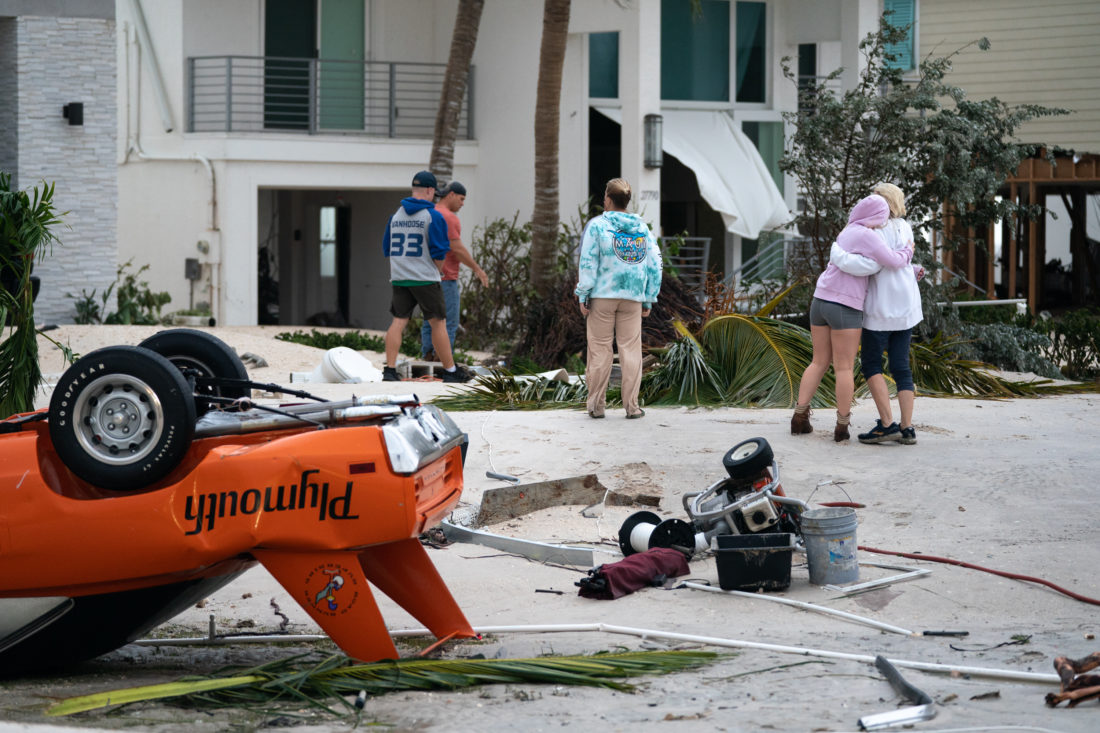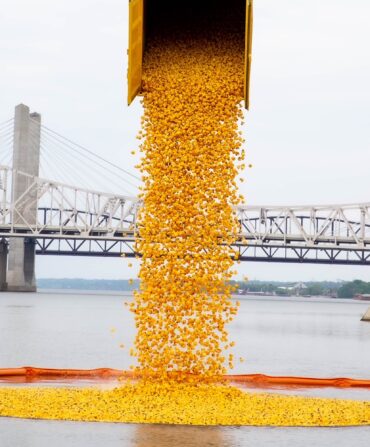August 31, 2021, two days after Hurricane Ida made landfall as a Category 4 just outside New Orleans, where I live, I slept with the frozen bags of flour I’d been hoarding since Pandemic Year One. In the 87-degree heat, they held onto cold for long enough that I got an hour or two of sleep.
During the storm, our roof had peeled back, collapsing ceilings. My parents, who’d ridden out the storm in their vestibule, had gone the next day to check on the house. Standing in the foyer, my dad called to say he could see sky. Driving back from our evacuation in Florida had taken eight hours, and I’d arrived alone at dusk to shovel sodden plaster off the floors. I knew too well what becomes of a wet house; fourteen years earlier to the day, Katrina had done identical damage to my childhood home. In the months it took my parents to get the high roof tarped, mold bloomed on every surface, in every wall. This time, though, I was on it. As darkness fell, I couldn’t stop, not even to find the LED lantern I’d bought somewhere beyond Mobile. By the light of my cellphone, I dragged my daughter’s dollhouse outside, our home’s sad, wet mini-me. I was ducking in again through her window when I heard someone open the front door.
“Morgan! I’m coming in!”
Filthy, in my sports bra and paint-stained yoga pants, I stood at the head of the stairs and saw Betsy, our petite neighbor, whom my mother has known for sixty-six years, standing in my destroyed front hall.
“Why don’t you come on over!” she said. “We’re gonna watch Seabiscuit on DVD—got it hooked up to the generator.” When I didn’t answer, she waggled her eyebrows in the dim light. “We have wine.”
I declined the offer. I had to do what I had to do. I shoveled muck until I collapsed in a cold tub of dirty water, too exhausted to go on. But I was grateful to know there was someone there to drink wine with, if I’d had the strength. Apparently, there were cookies, too.
* * *
Wednesday afternoon, as Hurricane Ian pummeled Southwestern Florida with near Category 5 force winds, I found myself defining compassion for my daughter—a spelling word. “It means to suffer with,” I told her, and it was what the Gulf Coast had been doing all day. We are trained in the language of the NOAA, millibars of pressure, ocean temperatures, wind speeds, and on Wednesday the words meant nothing good. Seventeen thousand of us get our weather forecast from a guy called @thetindermeteorologist on Instagram, because he’s trauma-informed. With great calm, he explains wind shear and steering currents, breaks down the “Cone of Uncertainty” into informed opinion, and sounds ALL CLEAR when he can. On Tuesday, he told his new subscribers in the Tampa area that they MUST EVACUATE NOW. That morning, in his stories, he’d said there was nothing left to do but pray.
In consoling loved ones and being consoled during hurricanes, I’ve learned that it does no good to diminish the disaster. No good to say, “It’s just stuff,” or “It could be worse,” or “At least we have our lives”—even if that’s true. When Tampa Bay is sucked dry by a storm’s convection and the Gulf’s waves roll past homes in Fort Myers Beach, that is a cataclysm, literally. “Deluge” is at the root of the word.
After putting my daughter to bed, I stayed up late with a friend trying to calm someone whose parents had not evacuated from Sarasota’s beach. We looked at maps, calculated flood depths. But what she needed most was to hear that she was not alone.
When a storm hits, there is an hours-long moment of total isolation, when no news gets in or out. The hurricane obstructs the satellites, and it seems your home has been erased from the map. As soon as the storm passes, it is almost a relief to see the destruction, to feel the world come rushing back.
On Wednesday night, the Cajun Navy, a civilian group formed after Katrina, began conducting water rescues. By Thursday afternoon, more than five hundred people had been saved, and those missing parents in Sarasota have sent a text. The President has still told us to expect “substantial loss of life.”
To those who have survived: This is trauma. You will overcome it, but it will be very hard. It does not matter if you lost a little or a lot, if you evacuated or rode it out. You have lived through something devastating. When everything falls apart, though, we come together. We hold each other up.
At first it may only be an offer of wine and Seabiscuit, accepted or refused, or it may be a member of the Cajun Navy lifting you down into his boat. It may be a musician like Louis Michot coming out to tarp your roof, or a writer like Silas House salvaging your memories, or a chef like Melissa Martin staying up for months to connect people who want to help with those who need it. Aid will come in many forms. You will give and you will receive. You will cook for one another. You will muck out each others’ rooms, install new drywall, paint the ceilings, sing. It will heal you and it will break you, and then you will have to learn again to breathe. As Melissa Martin said to me, “My body radiated with adrenaline for months after Ida hit, and then it didn’t, and I was tired for months. All I wanted to do was help—but at some point you need to put the oxygen mask on yourself.”
I tell you this not with optimism but with the honesty of experience. Living on the coast, we are endangered every year by storms that are only getting stronger, intensifying faster as the climate warms. We refresh hurricane tracks with the knowledge that, when they don’t hit us, they hit someone else.
As my daughter said at bedtime Wednesday, “I’m so sorry for the children who lost their stuff in the hurricane. I didn’t want that to happen.”
“None of us did,” I said. “But it does. So, tomorrow, let’s figure out how to help.”









